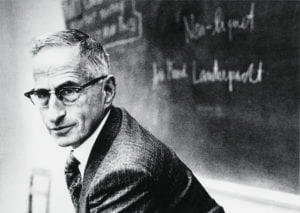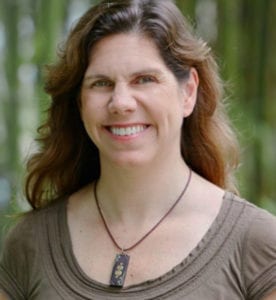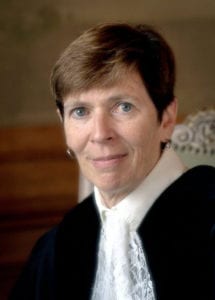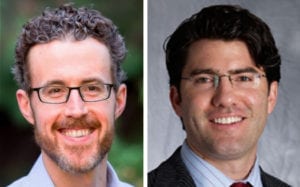January 11, 2018 (Thursday)
Lecture on “Return Without Redemption: Ex-Combatants in Northern Uganda”
 Dr. Chris Dolan
Dr. Chris Dolan
Director
Refugee Law Project
Makerere University (Uganda)
12:45-2:00 pm | 244 Law Building
lunch will be served on a first-come / first-served basis
Co-sponsored with the ASIL Transitional Justice Rule of Law Interest Group
Dr. Chris Dolan has worked extensively in sub-Saharan Africa in a range of academic, civil society and UN spaces since 1992. Since 2006, as Director of the Refugee Law Project in Uganda, he has done extensive practical work with refugee and IDP survivors of sexual violence in conflict settings, as well as global advocacy to draw attention to the gaps in humanitarian support to male survivors of such violence. This work is contributing to more comprehensive and inclusive international policies and practice regarding men as victims of sexual violence, as well as on the connections to sexual violence against women.
February 12, 2018 (Monday)
 Life in “L”: Gabriel Swiney on the US State Department’s Office of the Legal Adviser
Life in “L”: Gabriel Swiney on the US State Department’s Office of the Legal Adviser
Gabriel Swiney
Attorney, Office of the Legal Adviser
US State Department
4:30 pm | 244 Law Building
light refreshments will be served
Co-sponsored with the Career Development Office and the Berkeley Journal of International Law
Berkeley Law welcomes Gabriel Swiney, an attorney with 11 years of experience in the U.S. State Department’s Office of the Legal Adviser (“L”). Mr. Swiney’s work in L includes extensive experience with international law and foreign policy. He will provide an overview of his and the offi ce’s work, including how international law and lawyers contribute to the formation of policy, with specifi c examples from the international intervention in Libya in 2011 and the lifting of U.S. sanctions against Sudan in 2017.
For questions, contact Melanie Rowen at mrowen@berkeley.edu.
February 15, 2018 (Thursday)
Lecture on “Is There A Future for International Criminal Justice?”
 Stephen J. Rapp
Stephen J. Rapp
former US Ambassador-at-Large for War Crimes Issues
Office of Global Criminal Justice
12:45-2:00 pm | Moot Court Room (140 Law Building)
lunch will be served on a first-come / first-served basis
Co-sponsored with the ASIL Transitional Justice Rule of Law Interest Group, the Berkeley Journal of International Law, the Boalt Hall Committee for Human Rights, the Human Rights Center, and the International Human Rights Law Clinic
Stephen J. Rapp is a Distinguished Fellow at the United States Holocaust Memorial Museum’s Center for Prevention of Genocide and at The Hague Institute for Global Justice. During 2017-2018, he is also the Father Drinan Visiting Professor for Human Rights at Georgetown. He serves as Chair of the Commission for International Justice & Accountability (CIJA) that has collected and analyzed more than 750,000 pages of documentation from Syria and Iraq.
From 2009-2015, he was Ambassador-at-Large heading the Office of Global Criminal Justice in the US State Department. In that position he coordinated US Government support to international criminal tribunals, including the International Criminal Court, as well as to hybrid and national courts responsible for prosecuting persons charged with genocide, war crimes, and crimes against humanity.
Rapp was Prosecutor of the Special Court for Sierra Leone from 2007 to 2009 where he led the prosecution of former Liberian President Charles Taylor. From 2001 to 2007, he served as Senior Trial Attorney and Chief of Prosecutions at the International Criminal Tribunal for Rwanda, where he headed the trial team that achieved the first convictions in history of leaders of the mass media for the crime of direct and public incitement to commit genocide. Before becoming an international prosecutor, he was the US Attorney for the N. District of Iowa from 1993 to 2001.
February 21, 2018 (Wednesday)
2018 Stefan Riesenfeld Symposium:
“Lawyers on the Frontline: Protecting People and the Planet Over Profits”
Boalt Hall

Organized by the Berkeley Journal of International Law
Sponsored by the Miller Institute for Global Challenges and the Law
2.0 MCLE Credit Approved by the State Bar of California
One of the great traditions at Berkeley Law is the Stefan Riesenfeld Symposium, which allows students, alumni, faculty, and staff to come together to recognize and celebrate achievement in international law. Stefan Riesenfeld (’37) was a Berkeley Law professor and recognized authority in numerous legal specialties including international law, comparative law, property law, creditors’ remedies and bankruptcy, administrative law, and legal history.
The Riesenfeld Symposium is free and open to the public. To RSVP, click here.
▪ ▪ ▪
Panel Discussion on “Litigation to Advance International Environmental Justice”
100 Law Building | 12:45-2:00 pm
Panelists:
- Paul Hoffman, Partner, Schonbrun Seplow Harris and Hoffman LLP
- Alfred Brownell, Founder and Lead Campaigner, Green Advocates
- Prof. Roxanna Altholtz, Associate Director, International Human Rights Law Clinic, Berkeley Law
Moderator: Prof. Laurel Fletcher, Director, International Human Rights Law Clinic, Berkeley Law
▪ ▪ ▪

Keynote address by
Katie Redford
Co-Founder and Director, EarthRights International
110 Law Building | 5:30-6:30 pm
Introduction by Dean Erwin Chemerinsky, Berkeley Law
▪ ▪ ▪
Reception
Morrison Foerster Room (298 Law Building) | 6:30-7:30 pm

March 5, 2018 (Monday)
Lecture on “Necessary Evil: How to Fix Finance by Saving Human Rights”
 Professor David Kinley
Professor David Kinley
Chair in Human Rights Law, University of Sydney, and
Academic Expert Member, Doughty Street Chambers, London
12:45-1:45 pm | 134 Law Building
lunch will be served on a first-come / first-served basis
Marking ten years since the global financial crisis, Necessary Evil investigates the incredible impact the financial system has on human rights. The machinations of Wall Street can make or break people’s lives on Main Street or No Street, and yet today we have lost control of finance, and finance has lost our trust. Professor David Kinley explains how to reform finance in ways that will salvage its legitimacy by making finance a friend to human rights, not their enemy.
David Kinley is Chair in Human Rights Law at the University of Sydney and an Academic Expert Member of Doughty Street Chambers in London. He specializes in the area of the global economy and human rights and has worked for more than 25 years with governments, international organizations, law firms, corporations and NGOs in the field.
March 12, 2018 (Monday)
Conference on “The Political Economy and Legal Aspects of Trade Policy in the Trump Era”
9:00 am–4:00 pm | Warren Room (295 Law Building)
Reservation is required as lunch will be provided: https://berkeleylaw.wufoo.com/forms/trade-conference/
MCLE certificates will be available at the event
Sponsored by UC Berkeley Law School, the Berkeley APEC Study Center, the Institute of East Asian Studies, Miller Institute for Global Challenges and the Law, and the Clausen Center for International Business and Policy
With the Brexit referendum, election of Donald Trump, and the continued stasis at the World Trade Organization (WTO), the liberal, rules-based trading order is facing considerable pressure for business and policymakers. These pressures come from structural economic forces, systemic changes in geopolitics, domestic political conflicts in the US and elsewhere, and a rethinking of the ideological consensus around the benefits of free trade.
Since January 2017, we have witnessed a series events suggesting that the world trading system is functioning much less effectively than once thought. Developments include the US withdrawal from the Trans-Pacific Partnership (TPP), a freeze on negotiations for the US-EU Transatlantic Trade and Investment Partnership (TTIP) and the Trade in Services Agreement (TiSA), difficult renegotiations on NAFTA, complex Brexit negotiations, unfilled vacancies on the WTO Appellate Body, and difficult prospects for the WTO’s Eleventh Ministerial Conference.
This conference will focus on the political economy, business, and legal aspects of trade policy in the Trump era. Our goals are three-fold: 1) to examine the evolving structural economic and political forces driving recent trade policy developments; 2) to understand the legal, economic, and political bases for the shift in US trade policy priorities, and 3) to discuss likely responses from US trading partners and the overall consequences for business and the global economic order.
For more information, click here.
March 19, 2018 (Monday)
International Law and Mass Atrocity Crimes: A Career and Research Conversation with Professor Saira Mohamed
 12:45-2:00 pm| 170 Law Building
12:45-2:00 pm| 170 Law Building
Lunch will be served
Co-sponsored with the Berkeley Journal of International Law
Saira Mohamed’s primary interests are in the areas of criminal law and human rights, with her research focused on responses to mass atrocity. Examining the roles of criminal law and armed force in preventing and stopping widespread violence, her work considers the meaning of responsibility in mass atrocity crimes and seeks to unsettle conventional conceptions of choice and participation in this context. Her most recent publications have appeared in the Columbia Law Review, Yale Law Journal, and Stanford Journal of International Law. Her article “Deviance, Aspiration, and the Stories We Tell: Reconciling Mass Atrocity and the Criminal Law” (2015), won the Junior Scholars Paper Award from the Association of American Law Schools Section on Criminal Justice.
March 22-23, 2018 (Thursday-Friday)
Meeting on Protocolo La Esperanza
UC Berkeley
Co-sponsored with the International Human Rights Law Clinic and the Center for Justice and International Law (CEJIL)
This invitation-only meeting will focus on the Protocolo La Esperanza, an initiative launched one year ago concerning the criminal investigation of threats against human rights defenders.
April 1, 2018 (Sunday)
 Deadline for submitting application for Certificate of Specialization in International Law
Deadline for submitting application for Certificate of Specialization in International Law
Berkeley Law students may undertake a specialization in international law. The specialized curricular program ensures students develop a broad background in fundamental areas of law while receiving advanced training in international law. Students who meet the requirements are awarded a Certificate of Specialization in International Law.
For more information on the requirements for the certificate and an application, see the Certificate page.
April 3, 2018 (Tuesday)
Workshop on “Legal Governance of Historical Memory in Comparative Perspective”
10:00 am-6:00 pm | 107 Law Building
Co-sponsored with the T.M.C. Asser Institute (The Hague) and the Center for the Study of Law and Society
Panel I. “Governance of Historical Memory in European and US Law”
Chair: Dr. Ulad Belavusau (T.M.C. Asser Institute – University of Amsterdam)
Prof. Eric Heinze (Queen Mary University of London)
Prof. Robert Kahn (University of St. Thomas, Minnesota)
Dr. Heleen Touquet (KU University Leuven)
Discussant: Prof. Reuel E. Schiller (UC Hastings College of the Law)
Panel II. “Eastern Europe as a Current Hub of Memory Laws and Memory Wars”
Chair: Prof. Robert Kahn (University of St. Thomas, Minnesota)
Prof. Nikolay Koposov (Emory University)
Dr. Ulad Belavusau (T.M.C Asser Institute)
Marina Bán (T.M.C. Asser Institute)
Discussant: Prof. Richard Buxbaum (Berkeley Law)
Panel III. “Wider Perspective on Legal Governance of History”
Chair: Prof. Jonathan Simon (Berkeley Law)
Prof. Dimitry Kochenov (Groningen University)
Prof. Angana Chatterji (Center for Race & Gender – UC Berkeley)
Dr. Grażyna Baranowska (Polish Academy of Sciences)
Discussant: Prof. Mariane C. Ferme (Department of Anthropology – UC Berkeley)
April 3, 2018 (Tuesday)
Lecture on “Making the Case of Genocide”
 Jacqueline Isaac
Jacqueline Isaac
human rights attorney and Vice President, Roads of Success
12:45-2:00 pm | 244 Law Building
lunch will be provided
RSVP to: https://docs.google.com/forms/d/e/1FAIpQLSc20lDu7JiJF6yeYPTvWCerEZqJiuZ5QLFyO_ay1L9cHWRpcA/viewform
Co-sponsored with the Boalt Hall Committee for Human Rights
Jacqueline Isaac is a human rights attorney and the Vice President of the non-profit Roads of
Success. Ms. Isaac has spent her career advocating for women and minorities in the Middle
East. For the last two years, she has traveled to war-stricken parts of Syria to collect
testimonies from Yazidi girls that have escaped ISIS captivity. Ms. Isaac has brought these
testimonies to the US Congress, UK Parliament and the United Nations. This led to the
passing of the Genocide Resolution and the UN Security Council’s creation of the
Investigative Mechanism for the Yazidi Genocide.
April 4-7, 2018 (Wednesday-Saturday)
American Society of International Law’s Annual Meeting
Washington DC

The American Society of International Law (ASIL), with its membership of scholars, practitioners, and students of international law from around the world, will explore the theme of “International Law in Practice” at the 2018 Annual Meeting. This is the largest and most important gathering each year of international law practitioners, policymakers, and scholars.
Berkeley Law is an ASIL Academic Partner. The ASIL Annual Meeting regularly features lectures and panels made up of the world’s most eminent international lawyers, including many Berkeley Law faculty and alumni. Judge Joan E. Donoghue (’81) of the International Court of Justice will give the 2018 Grotius Lecture.
For more information, see the Annual Meeting website.
April 9-12, 2018 (Monday-Thursday)
 Torture and Accountability Week
Torture and Accountability Week
Organized by the Berkeley Law Committee Against Torture
Support from the Miller Institute for Global Challenges and the Law, the Center for Race and Gender, and the Journal of Middle Eastern and Islamic Law
Website: https://www.facebook.com/BLAgainstTorture/
▪ ▪ ▪
April 9 (Monday) — What is Torture and How Did We Get Here?
12:45-2:00 pm | 170 Law Building

What is torture and how did we get here? Torture has been prevalent both domestically, within the prison industrial complex, and as a part of the “war on terror.” This discussion will focus on the origins of modern forms of torture and they ways in which torture has been employed by U.S. officials both within and outside of the United States.
Panelists
Laurel Fletcher, Berkeley Law
Brad Adams, Human Rights Watch
Lunch will be served. RSVP https://goo.gl/forms/ClGBWKHZ9c1O9PlT2
▪ ▪ ▪
April 10 (Tuesday) — Race & “Othering”: Making Torture Possible

12:45-2:00 pm | 170 Law Building
Torture involves a fundamental act of “othering” in order for it to be possible. Who do we torture and why do we torture them? How has torture been mobilized by “benign” states and who do we conceptualize as the architects of torture beyond those in the room with the detainee? What are the ramifications of this legacy for the disparate impact torture has on people of color today?
The panel will feature Carmen Cheung, Legal Director, Center for Justice and Accountability
Lunch will be served. RSVP tinyurl.com/TAATuesday
▪ ▪ ▪
April 11 (Wednesday) — Professional Ethics, Torture & Accountability

12:45-2:00 pm | 170 Law Building
Is political dissent unprofessional? This panel will reflect upon the ethical obligations of doctors, psychologists, and lawyers who find themselves serving states that engage in torture. Panelists will weigh the relative merits of working to curb abuses from within government and publicly speaking out against odious practices. The panel will also consider the civic duties of professionals in the private sector.
Panelists
Rohini Haar, Physicians for Human Rights
Eric Stover, Human Rights Center
Alexa Koenig, Human Rights Center
Lunch will be served. RSVP https://goo.gl/forms/OqExxNtDHSGXKzDH2
▪ ▪ ▪
April 12 (Thursday) — Torture Litigation & the Future of Advocacy

12:45-2:00 pm | 170 Law Building
This panel features Dror Ladin of the ACLU National Security Project, part of the team from Salim v. Mitchell, who won a settlement for accountability of two psychologists involved in the CIA torture program. This case marks the first of its kind in CIA torture litigation as the judge rejected attempts to dismiss. Ladin will discuss what this landmark settlement means for future litigation and advocacy against torture, particularly under the current administration.
Lunch will be served. RSVP at tinyurl.com/TAAThursday
April 13, 2018 (Friday)

Career Talk: International Law Practice in the Public and Private Sectors
Matt Burton, Uber and David Bowker (’98), Wilmer Hale
12:50-2:00 pm | 244 Law Building
Lunch will be served
Co-sponsored with the Career Development Office
Matt Burton and David Bowker have both previously served as attorneys at the US Department of State, and Mr. Bowker has also served on the National Security Council staff.
Mr. Burton now manages regulatory affairs for Uber’s self-driving cars program and advises international teams on development of ridesharing regulations abroad. Mr. Bowker chairs WilmerHale’s international litigation practice.
Join us to hear about their experiences in government service, their current work in private practice, and career trajectories in international law.
For questions, contact Melanie Rowen at mrowen@berkeley.edu.
April 17, 2018 (Tuesday)
 Lecture on “Accountability for the Salvadorean Jesuit Massacre: An Exercise in Universal Jurisdiction”
Lecture on “Accountability for the Salvadorean Jesuit Massacre: An Exercise in Universal Jurisdiction”
Almudena Bernabeu
Guernica Group
12:45-2:00 pm | 244 Law Building
Lunch will be served
Co-sponsored with the Boalt Hall Committee for Human Rights and the Human Rights Center
Almudena Bernabeu has led the Jesuit Massacre’s investigation and prosecution in Spanish courts through universal jurisdiction, which recently resulted in the extradition of Colonel Orlando Montano from the United States. He is accused of planning and ordering the act and charged on counts of murder, crimes against humanity and state terrorism.
Ms. Bernabeu will talk about the Jesuit case, the political and legal barriers faced, and the thrilling strategy followed. She will also discuss the case’s impact on International Criminal Law and how universal jurisdiction can be a tool to end impunity of atrocity crimes.
Ms. Bernabeu is a renowned international lawyer specializing in international criminal law, human rights, and transitional justice. She has successfully litigated cases under the principle of Universal Jurisdiction and the Alien Tort Statute to assist victims to achieve truth and accountability for international crimes. She has formerly been the Transitional Justice Director of the Center for Justice and Accountability. She is presently the co-founder and director of the Guernica Group.
April 18, 2018 (Wednesday)
 Panel on “Killings by US Law Enforcement at the Border”
Panel on “Killings by US Law Enforcement at the Border”
12:50-2:00 pm | 132 Law Building
Lunch will be served
Sponsored by Amnesty International at Berkeley, Berkeley Immigration Group, Berkeley Journal of Criminal Law, Berkeley Journal of International Law, Berkeley La Raza Law Journal, Berkeley Law Committee Against Torture, Borders and Bodies Collective, Cal American Civil Liberties Union, California Asylum Representation Clinic, Chicanx Latinx Academic Student Development Center, Graduate Students de la Raza, International Human Rights Law Clinic, International Human Rights Workshop, International Refugee Assistance Project, La Raza Law Students Association, the Miller Institute for Global Challenges and the Law, Student Immigration Relief Clinic at Berkeley
Panelists
Maria Puga, widow of Anastasio Hernández-Rojas, a longtime resident of San Diego who was killed by border agents at the San Ysidro Port of Entry
Andrea Guerrero, Executive Director of Alliance San Diego and Co-Chair of Southern Border Communities Coalition
Aracely Abarca, Sarah Hunter, Sanaz Payandeh, & Victoria Tang, Interns with Berkeley Law’s International Human Rights Law Clinic, which represents the Hernández-Rojas family in litigation against the United States before the Inter-American Commission on Human Rights
To learn more about efforts to honor the life of Anastasio Hernández-Rojas:
https://alliancesd.nationbuilder.com/fundraiser_anastasio_mural
May 10, 2018 (Thursday)
Certificate of Specialization in International Law Award Ceremony
2:00 pm | Warren Room (295 Law Building)
Please join us to recognize the extraordinary achievements of the Berkeley Law students who have earned a Certificate of Specialization in International Law.
RSVP to Toni Mendicino (tmendicino@law.berkeley.edu)
May 15, 2018 (Tuesday)
The Globalization of the #MeToo Movement — Anti-Harassment Executive Academy
UC Berkeley campus
 Presented by the Berkeley Comparative Equality and Anti-Discrimination Law Study Group
Presented by the Berkeley Comparative Equality and Anti-Discrimination Law Study Group
Sponsored by the Miller Institute for Global Challenges and the Law and the Fox Networks Group
MCLE credit available
Sexual harassment is a global problem. It is increasingly affecting the well-being of private and public employers in North America, Europe, Australia and Asia. What should California lawyers, managers and HR professionals know about the globalization of the sexual harassment crises? On May 15, 2018, legal scholars and legal practitioner experts from Europe, Asia, Australia and North America will gather at Berkeley Law to explore this important topic with California lawyers, managers and HR professionals.
For more information, visit the conference website.
Read an article about the conference here.
Topics include:
• Keynote address from Professor Catharine MacKinnon, pioneer of sexual harassment law
• The current state of the law, reports from Australia, China, the EU, Hong Kong, India, and the US
• Examining anti-harassment policies, training, and investigations
• Social media & due process
• Protecting vulnerable workers
• Innovations in legislation in New York, California, France, Australia, and India
• Strategies for change, a round-table featuring CA elected officials

June 14-15, 2018 (Thursday-Friday)
International Migration and Refugee Law Workshop
UC Berkeley campus
This invitation-only workshop, the second of two organized by Professor Katerina Linos this year, will bring together scholars to discuss current topics in migration and refugee law.








